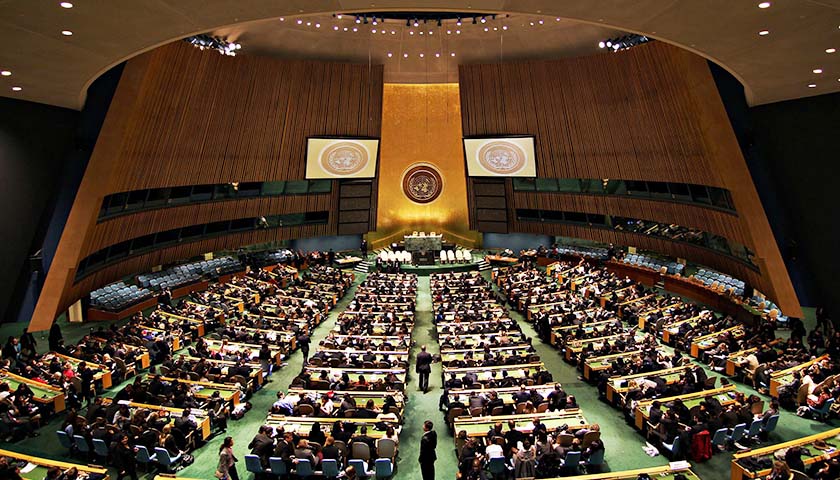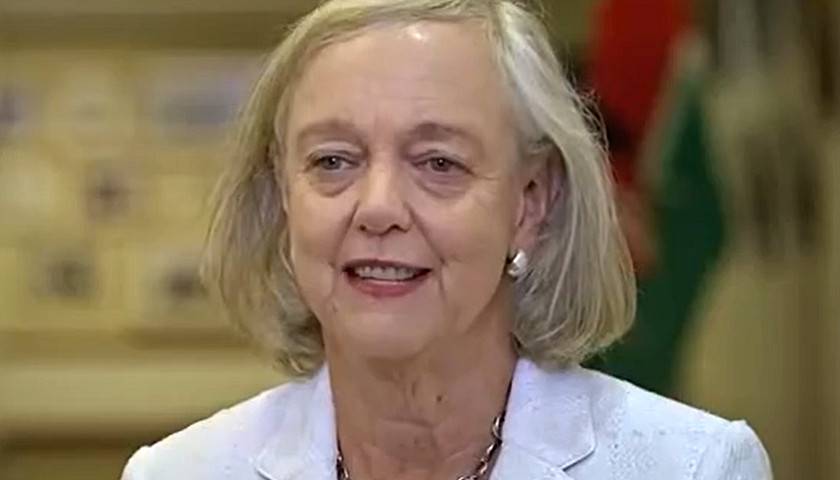by James Cohen
A United Nations (U.N.) policy proposal that outlines how to combat online “mis- and disinformation and hate speech,” including through demonetization, is informed by work from groups that actively push to censor conservative speech online.
The policy brief, titled “Information Integrity on Digital Platforms,” is intended to help develop an online “code of conduct” that the U.N. plans to unveil during its Summit of the Future in 2024, calls for demonetization and suppressing the spread of what it considers “mis- and disinformation and hate speech.” As examples of effective strategies, the policy proposal routinely cites organizations that have explicitly worked to censor conservatives or have advocated for the censoring of conservative viewpoints.
“The American public should be skeptical of any attempt by the U.N. to monitor, regulate, or control speech,” Michael Chamberlain, director of Protect the Public’s Trust, a government watchdog that among other things monitors state-directed censorship efforts, told the Daily Caller News Foundation. “It is not surprising that the organization that elevates the likes of Iran, North Korea, China, and other oppressive regimes would reference or partner with entities that participate in efforts to suppress speech that does not fit approved narratives.”
 The global organization’s brief recommends “exclusion lists” to help advertisers avoid funding what the U.N. considers to be “mis- and disinformation and hate speech,” citing the Global Disinformation Index (GDI) as an example of a “civil society” group that has been successful in demonetizing so-called disinformation. GDI is a United Kingdom-based nonprofit that describes itself as a “non-political” monitor that seeks to “disrupt the business model of disinformation,” according to its website.
The global organization’s brief recommends “exclusion lists” to help advertisers avoid funding what the U.N. considers to be “mis- and disinformation and hate speech,” citing the Global Disinformation Index (GDI) as an example of a “civil society” group that has been successful in demonetizing so-called disinformation. GDI is a United Kingdom-based nonprofit that describes itself as a “non-political” monitor that seeks to “disrupt the business model of disinformation,” according to its website.
GDI has confidential “exclusion lists” that it sells to online advertising companies for the purpose of demonetizing speech, according to the Washington Examiner. Although the blacklists are private, GDI does publicize the “disinformation” risk scores it assigns to many news outlets, giving conservative news outlets high risk scores and liberal news outlets low risk scores in its “Disinformation Risk Assessment.”
For example, GDI rated NPR and The New York Times as “minimum” risk level, The Washington Post and BuzzFeed as “low” risk level, The New York Post and Daily Wire as “high” risk level and The Federalist and Newsmax as “maximum” risk level.
The U.S. State Department funded GDI through its Global Engagement Center, the DCNF first reported.
Additionally, the U.N. credits GDI for “noting that while freedom of expression is a fundamental human right, profiting from it is not.”
The U.N. also cited British organization Center for Countering Digital Hate’s (CCDH) research on profiting off anti-vaccine rhetoric. The organization notes its work “has forced change at once-reluctant social media platforms and led to anti-vaxxers removing their propaganda to avoid being banned.”
The U.N. goes on to state “disinformation can likewise prove deadly” following its citation of CCDH.
CCDH supports demonetizing “disinformation,” and released a report dubbed “The Toxic Ten” calling on Facebook and Google to pull advertisements from ten websites, including many conservative news publications, that the group claims espouse climate “misinformation,” including Breitbart, Newsmax, The Washington Times, The Federalist Papers and The Daily Wire.
Mike Benz, executive director of the Foundation for Freedom Online, told the DCNF that many of the organizations that the U.N. references in its brief “are effectively government cut-outs.”
“Global Disinformation Index is funded by the State Department. CCDH is a cut-out of the UK Foreign Office,” Benz said. “None of them are independent.”
Furthermore, the U.N. cites Global Witness’ research that states Facebook’s algorithm contributes to the spread of “climate disinformation.” Global Witness claims “the reality of the climate crisis is an undeniable truth,” and recommends that “Facebook and all social media companies produce … plans to meaningfully reduce the spread of climate disinformation on their platforms.”
As examples of “climate disinformation,” Global Witness cites claims or narratives that are critical of green energy efforts, such as “Net Zero is bad for the economy,” “Environmentalists are hysterical,” and “Renewable energy doesn’t work.”
“Instead of enabling a harmful environment, [big social media platforms] should be quicker to act on content that clearly violates their policies,” Global Witness recommends. “Properly resourcing their content moderation systems would help reduce the amplification and spread of disinformation around climate or climate science, and incendiary or hateful content.”
– – –
Jason Cohen is a reporter at Daily Caller News Foundation.
Photo “Googleplex HQ” by The Pancake of Heaven!. CC BY-SA 4.0.






